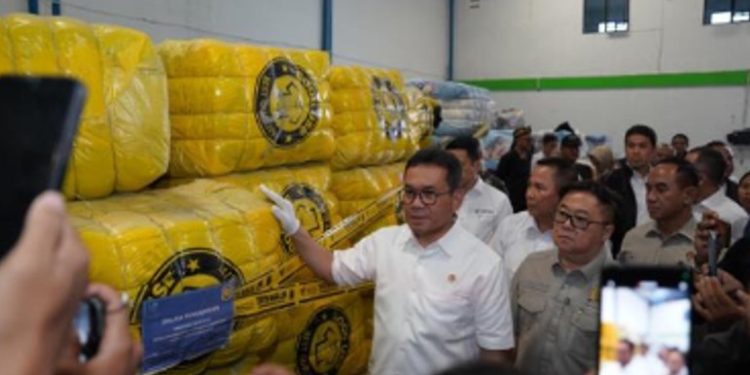Jakarta, Indonesia Sentinel — Indonesia’s Trade Ministry has seized thousands of bales of illegal secondhand clothing imports worth Rp112 billion (about $7.3 million) in raids across the Greater Bandung area.
Trade Minister Budi Santoso said the bust followed inspections of warehouses in Bandung city, Bandung regency, and Cimahi carried out on August 14–15 in cooperation with the State Intelligence Agency (BIN) and the military’s Strategic Intelligence Agency (BAIS TNI).
“In total, 19,391 bales of used clothing imported illegally, with an estimated value of 112.35 billion rupiah, were secured from 11 warehouses,” Budi said, Tuesday (August 19). The seized goods were traced to shipments from South Korea, Japan, and China.
Authorities confiscated 5,130 bales worth Rp24.7 billion from three warehouses in Bandung city, 8,061 bales worth Rp44.2 billion from five warehouses in Bandung regency, and 6,200 bales valued at Rp43.4 billion from three warehouses in Cimahi.
Budi said the goods were brought in by seven companies, which intended to distribute them to major markets across Indonesia, including Jakarta and Surabaya, where they are typically sold through “thrifting,” a popular trend among young consumers.
Read Also:
U.S. Import Tariffs on Indonesian Goods Take Effect, Rate Set at 19 Percent
The seized clothing has been secured as evidence while intelligence agencies continue their investigation. Authorities have already named suspects linked to the importing companies, Budi added.
“The import of used clothing is prohibited in Indonesia because it threatens the domestic textile industry, especially small and medium enterprises, and poses health risks to consumers,” Budi said.
The ministry stressed that the illegal secondhand clothing imports has violate Indonesia’s Trade Law as well as regulations governing restricted imports.
Moga Simatupang, director general of consumer protection and trade compliance at the Trade Ministry, said businesses found guilty of violating import laws face both administrative and criminal sanctions, ranging from written warnings and suspension of business operations to the revocation of licenses.
(Raidi/Agung)


























